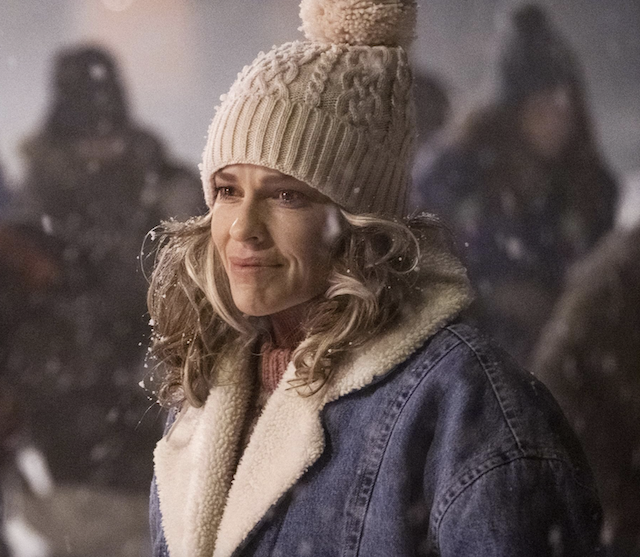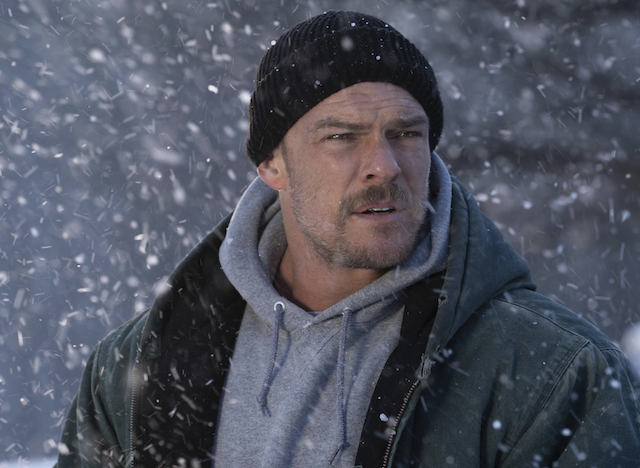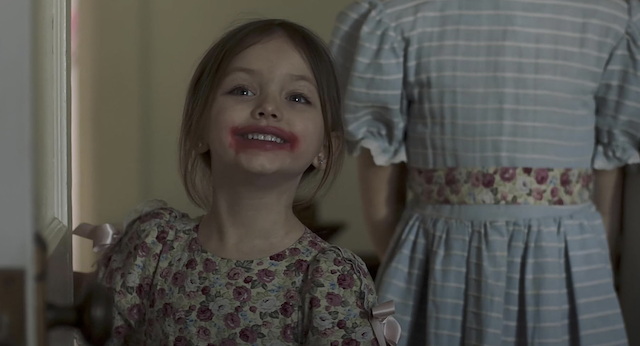
Photo by Lionsgate – © Lionsgate
People overcoming their differences to selflessly help the greater good of their community shows their true integrity. The new drama, Ordinary Angels, is an inspirational retelling of a true story about the Schmitt family, which relies on the help of their neighbors in order to save their young sick daughter. Those acquaintances willingly put their own challenges and differences aside to rally together and secure the liver transplant the young girl desperately needs.
The film was directed by Jon Gunn, who also served as a producer with Jon Berg. Ordinary Angels screenplay, which is based on the actual events that the Schmitt family and their neighbors went through, was written by Kelly Fremon Craig and Meg Tilly. The movie stars Hilary Swank, Alan Ritchson, Nancy Travis, Tamala Jones, Drew Powell, Amy Acker, Skywalker Hughes and Emily Mitchell.
Ordinary Angels follows Sharon Stevens (Swank), a fierce but struggling hairdresser in small-town Kentucky who discovers a renewed sense of purpose when she meets Ed Schmitt (Ritchson), a widower working hard to make ends meet for his two daughters. With his younger daughter, Michelle (Mitchell) waiting for the liver transplant, Sharon sets her mind to helping the family. What unfolds is the inspiring tale of faith, everyday miracles and ordinary angels.
The drama is now playing in theaters, courtesy of Lionsgate. In honor of the film’s release, Berg generously took the time recently to talk about helming and producing the project during an interview over Zoom.

Photo by Lionsgate – © Lionsgate
Q: You served as one of the producers the new drama, Ordinary Angels, which was written by Kelly Fremon Craig and Meg Tilly. What was it about the script that convinced you to produce the film? What was your overall approach to producing the movie?
JB: I was told about the story about 10 years ago by Dave Matthews, the incredible singer. I had a meeting with him when I was at Warner Bros., and we had an amazing time. He’s hilarious and garrulous, and we had a fun meeting.
Then at the end of the meeting, he said, “You know, I’d love to tell you about a story that I had come into contact with.” It was true story, and he had worked on the screenplay. At one point, he was even thinking about starring in the movie.
I was blown away. I couldn’t believe that that was a true story about this incredible woman, Sharon Stevens, and she had thrown herself in to try to help this little girl, Ed Schmitt’s daughter, Michelle. Sharon was just moved by a newspaper article about them, and decided that she was going to help save this little girl’s life.
So I was taken when Dave pitched me the story, and then he sent me the script that he had worked on with Meg Tilly. I was really moved. It was all there in the screenplay. It really made me cry and laugh, and it inspired me.
It was then that I signed on to try to make the movie. When I left Warner’s in 2018, I called up Dave. I asked about what was happening with the script, and if it was something that was still available. I asked if I could partner up with him to try to get the movie made, and he agreed.
That began the journey. I quickly set it up at Lionsgate and sold it to them. They fell in love with the script.
From there, we did a rewrite and got John Gunn to do a final pass on the script. Then we got the great Kingdom Story Company guys to come in and help produce the film, and shortly thereafter, we were in production.
Q: Jon Gunn, who you just mentioned, served as the director and your fellow producer on the drama. How did you collaborate together while making the film?
JB: He’s the most delightful human being. He is so collaborative and has such a big heart and a warm spirit. He’s also hilarious.
He loves movies. I think anyone who’s involved in what we do loves movies. You love watching and talking about them with other folks. You love comparing experiences and notes about what lines of dialogue and which characters you liked,
So I shared that with Jon on a lot of different movies, especially comedies – he’s a big fan of comedy. It was just great.
He’s an amazing filmmaker. He’s so detail oriented and just a lovely human being.
Every day in prep, we would sit and talk with the crew because filming the helicopter sequence in the parking lot of the church was really complicated. It was nighttime, there was a helicopter and special effects, and there was also snow on the ground. There were different levels of the lot being cleared by the church goers, so there was a lot going on there. We also had to get that all in the very first week of shooting.
So there are a lot of meetings to make sure that everybody was on the same page and knew what was expected of them and how they could deliver.
That really came down to Jon being a great leader. He was able to express what he wanted and treated people with respect and kindness. He did all of that on set. He’s a lot of fun to collaborate with.
Q: Ordinary Angels is set in Louisville, Kentucky, but was shot in Winnipeg, Canada. How did the location influence the shoot?
JB: Well, it was cold as heck. I remember we were scouting and our location scout and I were having a conversation. We had just been in a church and it was warm in there, as the heat was on. It was actually the church that we ended up using for the funeral of Ed’s wife, Theresa. It was also the same church that Pastor Dave served in, so it doubles for Southeast Christian. Then it’s also where Ed and his family come back to.
Anyhow, we were inside there and the heaters were on and we were all dressed in winter clothes. We had a little bit of perspiration on us. I then walked outside with Neil, our location scout, and we were standing across from one another outside and having a conversation.
I saw something that I’ve never seen happen before to a human being in front of me. I asked him, “Is what’s happening to you happening to me right now?”
The moisture on his eyebrows and his eye lashes was freezing, and turned into frost. I was watching it form on his eyebrows and his eyelashes. (Berg laughs.) The same thing was happening to me. So there’s a cold that occurs up there that’s unlike anywhere else.
However, it was a great place to shoot. The crews were great. We got a springtime after the snow, so Mother Nature accommodated us. It really doubled well for Louisville. They sort have a similar terrain. So we found everything that we needed, and it was it was a pleasure to make the film up there.

Photo by Lionsgate – © Lionsgate
Q: The movie stars Hilary Swank in the lead role of Sharon. How did Hilary infuse her personality into her real-life character?
JB: Hilary’s a pro and is just incredible. She came in and knew the part and what she wanted to do with it. She had the accent dialed in. She came to set prepared, of course – you don’t win two Academy Awards by not being a pro.
She was also super fun. We played tennis together when we weren’t working. She’s a big tennis fan and I’m a tennis fan, so we had some fun times playing tennis together.
She’s a powerful lefty, and is sort of like a Rafael Nadal type. She gets to everything. She’s very difficult to beat in a game’ I did not beat her in the entire time we played together. (Berg laughs.)
But she was awesome and so kind and considerate. She’s such a light and a joy.
I think she had fun on set. It was a great role for her, and she had fun outfits and hair, and also a fun accent. She’s the heart and soul of the movie, obviously.
She’s really funny. There are some lines in the movie that people really break out into laughter that she delivers. I think she did an amazing job. I thought she gave a great performance.
Q: Speaking about the humor, why did you feel it was important to incorporate that wit into such a serious story?
JB: We talked about it a lot. Jon was very keen, as was I and everybody else, to include that humor.
We knew that there were going to be some heavy moments in the film. There’s a scene where this little 5-year-old girl starts to cough up blood, and that actually happened to Michelle in real life.
So there’s some serious stuff going on in this movie and is very heavy. Theresa dies in the first 60 seconds of the movie, so it was important to sort of leaven that heaviness with some humor. You need that release as an audience. It allows you to pick yourself back up and then go for another round of something else that is upsetting in Michelle’s story.
So we always talked about it. We wanted the movie to have some light spots to it as well, to help balance out the heavier aspects.
Q: Lionsgate, which you mentioned earlier, is distributing Ordinary Angels in theaters nationwide. How did you secure the distribution for the drama?
JB: I sold the movie to Nathan Kahane at Lionsgate. Nathan, who is the president of production over there, has been a friend of mine for over 30 years. He’s a great guy and am experienced filmmaker and a producer in his own right.
We had a breakfast together years ago now, and I pitched him the story, just like it was pitched to me by Dave Matthews. Nathan also fell in love with it.
He then read the script and called me and said, “I cried twice reading it. It’s an extraordinary story. I want to tell this story and make this movie.”
Right from that moment forward, what’s great is they held true to their word. They were the ones that put me in a partnership with Kingdom, which is awesome. I loved working with Jon Erwin, Andy Erwin, Kevin Downes and of course, Jon Gunn, who came through them. Lionsgate has also been awesome.
The movies is playing on about 2,900 screens. So it’s a wide theatrical release movie, which is incredible; you don’t get that type of release very often anymore. In my old days at Warner Bros. it was sort of the norm, but it’s just not the norm anymore with streaming.
So I’m thrilled that everyone wants this movie wants to be seen on the big screen and be a communal experience. We want everyone to see it and experience it with other folks, which I think amplifies it and makes it even more special. So I’m thrilled that it’s a movie that people can catch in theaters.
Check out more of Karen Benardello’s articles.
Here’s the trailer of the film.

